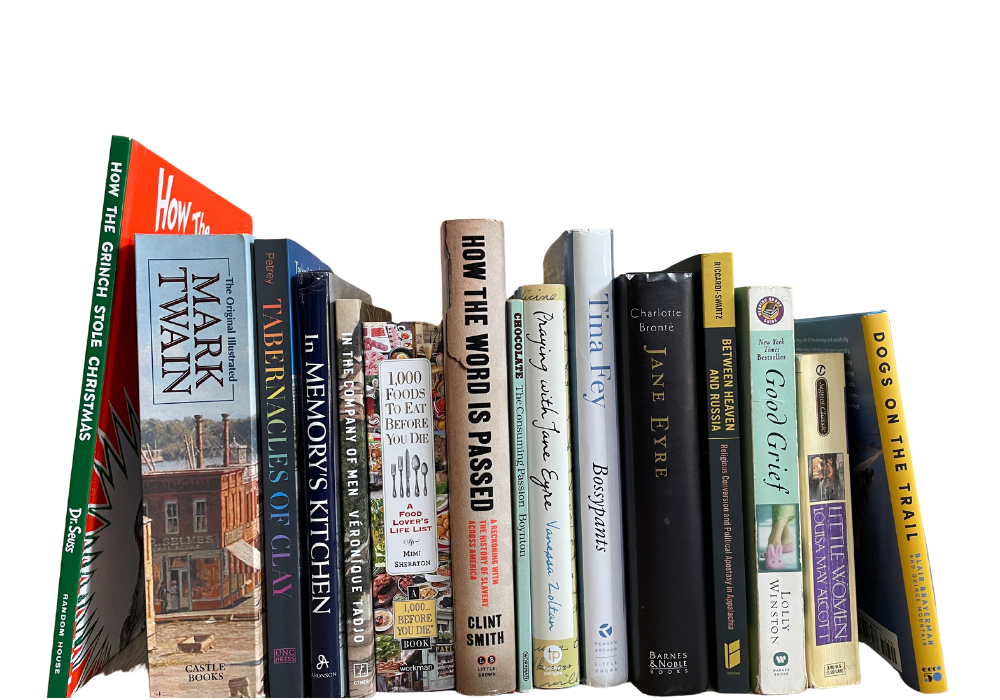Aug. 9 is Book Lovers Day, and what better way to celebrate (besides reading your favorite book) than hearing from book lovers about their favorite books? The NAU Review asked staff from Cline Library and other NAU departments to share their favorite tomes in honor of this bookish celebration.

Favorite book: Who Thought This Was a Good Idea? by Alyssa Mastromonaco
This book is great for anyone considering a career in public service, especially as a woman. It is a relatable and funny read that leaves you wanting to know more.
Mike Taylor, manager, Solutions Architecture
Favorite book: Zen and the Art of Motorcycle Maintenance by Robert M. Pirsig
I love this book from start to finish, but one particular scene has always stuck with me. In it, Phaedrus is teaching writing outdoors and a student is stuck and unable to begin writing. Phaedrus asks the student to focus on smaller and smaller views of the surrounding area until he asks the student to focus on a single brick from a single building. Suddenly, the student becomes unstuck and is able to complete (and enjoy) the assignment.
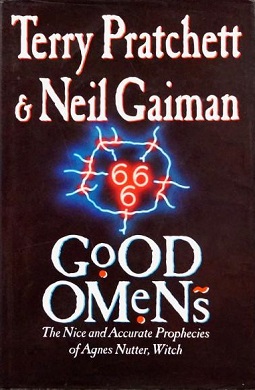
John J. Doherty, head of research and information services
Favorite book: Good Omens: The Nice and Accurate Prophecies of Agnes Nutter, Witch by Terry Pratchett and Neil Gaiman
I read this book the day it was published. The hardback first edition of this book (from 1990) is the last book I bought in Ireland before emigrating to the U.S. When I read that Pratchett (whose Discworld was just finding its turtle legs) and Gaiman (of Sandman fame) teamed up to re-write the Book of Revelation, I was first in line at my local Easons to buy a copy. Here we have a ripping yarn(!) full of jokes only a recovering Catholic would get, complete with Pratchett’s footnotes and Gaiman’s Apocalyptic Horsepersons (and accompanying bikers). I still laugh out loud reading this many years later (and, yes, I have seen the TV show, but I also have the book in paperback, Kindle and two Audible versions). And, of course, the snide remarks thrown at Americans (usually in footnotes), such as “I’ve never really liked the Yanks. … You can’t trust people who pick up the ball all the time when they play football.”
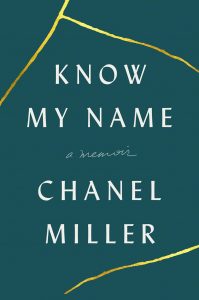
Favorite book: Know My Name by Chanel Miller
I’m a big fan of memoirs, and this one was so transformative. Chanel Miller showed such courage when she testified against the Stanford University student who sexually assaulted her in 2015. I am in awe of her bravery, her candidness and the poetic way she tells her story. Know My Name is a painful read, but an important piece of the ongoing conversation about the issue of sexual violence on college campuses. My favorite quote from it is, “It is not a question of if you will survive this, but what beautiful things await you when you do. I had to believe her, because she was living proof. Then she said, good and bad things come from the universe holding hands. Wait for the good to come.”
Hank Hassell, associate librarian
Favorite book: Desert Solitaire: A Season In the Wilderness by Edward Abbey
This is the book that put Abbey’s name on the literary and environmental map. In the main, it recounts his life one summer as a national park ranger in Arches National Monument just outside of Moab, Utah. In it he describes his love and attachment for the wilderness and why it is important to save and preserve the wild places as part and parcel of our souls as Americans. My favorite quotation from the book: “There are those of us who in our nightly devotions never fail to pray for a small, precision earthquake in the vicinity of Glen Canyon Dam. We are devout, we have faith, and someday our prayers will be answered.”
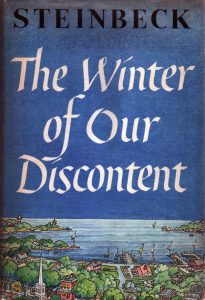
Favorite book: The Winter Of Our Discontent by John Steinbeck
My favorite book is the last of Steinbeck’s novels, The Winter Of Our Discontent. In length, it sits midway between Steinbeck’s tomes (Grapes of Wrath, East of Eden) and his ‘tinies’ (Cannery Row, Of Mice And Men). Through its pages, we see its protagonist wrestling with the world, as all people who are not exceptionally privileged must. Sometimes the wrestling resembles an intimate dance; sometimes a bare-knuckled brawl. Most times the turmoil is contained within himself—like an agitated water bottle making mental whirlpools; sometimes, it spills out onto the streets, laid bare for the scrutiny of others—all others. Somehow, this external scrutiny—despite being less intense than the pressure he puts upon himself—is more painful to him. The lengths he will go to escape this pain is not unlike the lengths we as a society go to avoiding the things we should be most careful with: our planet, our fellows, ourselves.
My favorite passage is the start of the third chapter when our protagonist reflects on his perception of his wife’s sleep: “My wife, my Mary, goes to her sleep the way you would close the door of a closet. So many times I have watched her with envy. Her lovely body squirms a moment as though she fitted herself into a cocoon. She sighs once and at the end of it her eyes close and her lips, untroubled, fall into that wise and remote smile of the ancient Greek gods.”
The beauty I find in this passage is that he’s observed his wife frequently and carefully enough to form a lyrical opinion of her sleeping state of mind. The beautiful contradiction lies in the fact that he doesn’t actually know what’s going on in his wife’s person. It’s partly his projection—perhaps a desire to see himself as uniquely different to his closest earthly companion—and partly it’s the byproduct of his sensitive nature to observe and characterize the other. His wife is a necessary part of this external world—a world that’s at once a source of terrifying scrutiny but also a necessary component of his existence.
I find the book reflects on many contemporary human struggles, many of which are rooted in our uneasiness with change.
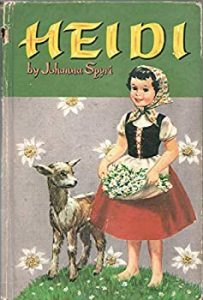
Favorite book: Heidi by Johanna Spyri
I received my first copy for Christmas when I was 6 years old, and I still have it. I read any time I feel sad or depressed as it always makes me happy. It was my first book of my very own that was not shared with my four older siblings or my younger sister. Whenever I read it, I have that sense of wonder of a far-off land, in the mountains playing in the sunshine with goats and birds laughing. My favorite part of the story is when the servants in Herr Sesemann’s house believe there is a ghost haunting them, which turns out to be Heidi sleepwalking because she is so homesick for the mountains and hates living in the city. It resonates with me throughout my life.
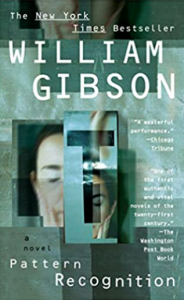
Favorite book: Pattern Recognition by William Gibson
One of my favorite books that I return to time and again is Pattern Recognition by William Gibson. The first time I read this book I was blown away by the world and characters created by Gibson. I think I read it in one sitting. By now I’ve read it so many times I’m on my fourth or fifth copy. I also keep giving away my copies because I want everyone I know to read this book. It’s amazing!
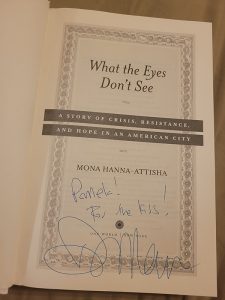
Favorite book: What the Eyes Don’t See by Mona Hanna-Attisha
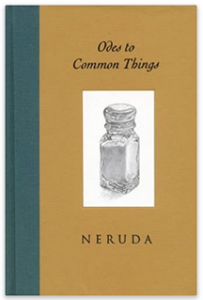
Favorite book: Odes to Common Things by Pablo Neruda
Pablo Neruda’s odes always brings me to appreciation—appreciation of the small things in life, the things we take for granted, the things that are always there, such as salt, socks, tomatoes, cats. Neruda brings a life to these objects like no other writer. He embraces the reader with his clever words, stroking our heart and mind and making connections to memories and life. Every time I go back to his writing, I experience tangible goosebumps and somehow his work helps me not take things for granted. His odes are quite shareable.
Excerpt from “Ode to Salt:”
In its caves
the salt moans, mountain
of buried light,
translucent cathedral,
crystal of the sea, oblivion
of the waves.
And then on every table
in the world,
salt,
we see your piquant
powder
sprinkling
vital light
upon
our food.
Expert from “Ode to the Cat:”
Man wants to be fish or fowl,
the snake would like to have wings
the dog is a disoriented lion,
the engineer would like to be a poet,
the fly studies to be a swift,
the poet tries to imitate the fly,
but the cat
only wants to be a cat
and any cat is a cat
from his whiskers to his tail,
from his hopeful vision of a rat
to the real thing,
from the night to his golden eyes.
Did you know that Cline Library has an NAU Authors room? The shelves are filled with novels, histories, research, books of poetry and personal essays and more written by NAU faculty. Explore their works online or browse the shelves in this comfortable reading nook to find your new favorite book!
